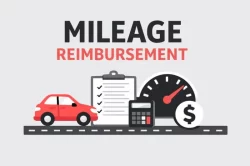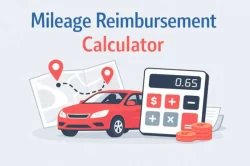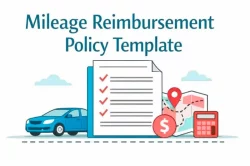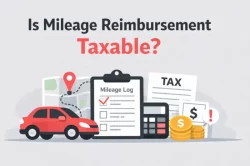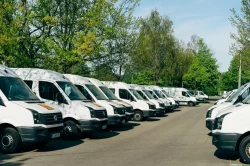Table of Contents
Ever use your own car for work? Maybe you visited a client or went to the office supply store. If you did, your employer might pay you back for that driving. This is called mileage reimbursement. It’s a way for businesses to cover the cost employees pay when using their personal car for business trips. It helps employees fairly, and it makes things easier for bosses, too.
What is Mileage Reimbursement?
Mileage reimbursement means your job pays you back for using your personal vehicle for work. You don’t get paid for driving to work or from work usually. That’s called commuting. Mileage reimbursement is only for travel during your workday or for trips directly related to your job, like going to meetings or visiting different work locations.
It’s about being fair. When you drive for work, you pay for gas, wear and tear on your car, oil changes, and hopefully, you have good insurance. These costs add up! Your employer pays you a certain amount for each mile you drive for business to help cover these expenses.
For instance, maybe you are a salesperson visiting customers. You drive your own car to see them. Your employer reimburses you for those miles. Or maybe you manage a few different stores for a company. You drive your car between locations to check on things. Your employer should pay you for those miles.
The money given back for miles is usually not taxed for the employee. This is because it’s seen as paying back an expense you already paid for.
Who Gets Mileage Reimbursement?
Most of the time, mileage reimbursement is for employees who use their own personal cars for company business. Your manager tells you where to go, and you drive your car to get there. They might even monitor your miles with a service like Timeero for reliable employee tracking.
What about self-employed people or independent contractors? They cannot “reimburse” themselves in the same way an employee does through an employer. Instead, they can subtract the cost of using their car for business from their taxes. This is called a tax deduction. They can use the IRS standard mileage rate or track all their actual car costs (like gas, repairs, and insurance) to figure out their deduction amount. It works differently, but it also helps cover their driving costs.
Some jobs are naturally tied to driving, like delivery drivers (think food or packages). The rules for them might be a bit different, depending on whether they are employees or independent contractors.
FAQ
What is mileage reimbursement?
Mileage reimbursement is the process by which employers compensate employees for business-related vehicle use, typically calculated using a per-mile rate set by the IRS or an agreed-upon fixed and variable rate.
How do I calculate my mileage reimbursement?
You calculate reimbursement by multiplying the total business miles driven by the applicable per-mile rate (e.g., the IRS standard mileage rate) or by applying a FaVR method that separates fixed and variable costs. Tools like MileIQ or the Triplog app calculate it for you. Read a review of the Driversnote app to see if it is the best for you.
If you are interested in your tax breakdown in general, use a 1099 tax calculator.
Can MileageWise streamline mileage reimbursement?
Yes—MileageWise automatically logs your business trips, categorizes them appropriately, and generates company mileage logs ready for claiming mileage on taxes, ensuring accuracy and compliance.



